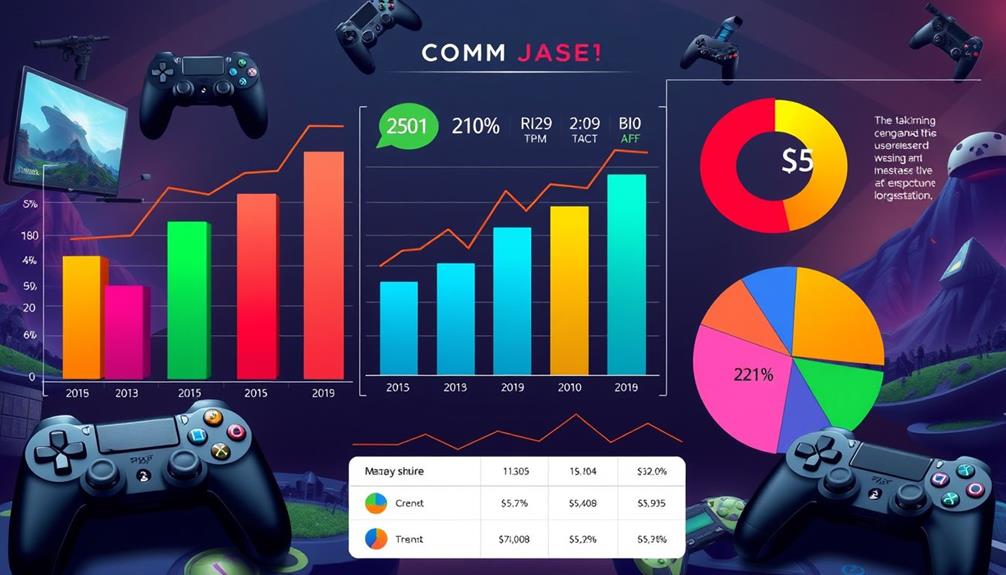Apple's crushing the competition in the gaming world with a staggering net worth of $526.82 billion, thanks largely to its App Store transactions. Tencent follows with $197.4 billion, fueled by microtransactions from popular games. Microsoft isn't far behind, boasting a net worth of $402.06 billion, greatly boosted by its massive acquisition of Activision Blizzard. Sony, while a key player with its PlayStation brand, lags with a net worth of $37.45 billion. These powerhouses shape the industry's landscape, and if you're curious about their strategies and future prospects, there's plenty more to uncover.
Key Takeaways
- Apple leads the gaming sector with a net worth of $526.82 billion, primarily from App Store transactions and mobile gaming revenues.
- Tencent follows with a net worth of $197.4 billion, driven by microtransactions in popular franchises like League of Legends.
- Microsoft ranks third with a valuation of $402.06 billion, significantly bolstered by its $69 billion acquisition of Activision Blizzard.
- Sony's net worth is approximately $37.45 billion, supported by the successful PlayStation brand and exclusive gaming titles.
- Electronic Arts holds a net worth of $22.9 billion, dominating the sports gaming genre with popular franchises like FIFA.
Overview of Gaming Industry Valuation
The global video game industry is a powerhouse, valued at $217.06 billion in 2022 and projected to soar to $583.69 billion by 2030. This impressive growth reflects a compound annual growth rate of 13.4% from 2023 to 2030, showing just how lucrative gaming has become.
You'll notice that Asia Pacific leads the charge, accounting for over 48% of global gaming revenue. Countries like China, Japan, and South Korea are key players in this market, driving significant income through various gaming platforms. Additionally, the gaming sector is increasingly focusing on sustainability and responsible investing, as investors seek companies that align with ESG considerations.
As you dive deeper, you'll see major companies contributing to this valuation. Sony, with a net worth of approximately $37.45 billion, has solidified its position thanks to its popular PlayStation console line.
Meanwhile, Tencent stands out with a staggering net worth of around $197.4 billion, earning most of its revenue through microtransactions in games like League of Legends. Activision Blizzard also makes waves with iconic franchises and a net worth of $29.23 billion.
Together, these companies illustrate the immense scale and profitability of the global video game industry, highlighting its monumental impact on entertainment and culture.
Who Are the Major Players?

When you think about major players in the gaming industry, the spotlight often shines on Sony, Microsoft, and Tencent. Each of these companies has carved out a significant share of the market, backed by impressive net worth and popular gaming franchises.
Additionally, their financial strategies often include elements of diversification strategy, allowing them to mitigate risks across various gaming platforms and genres.
Let's take a closer look at how they stack up against each other and their key competitors.
The Big 3
In the ever-evolving gaming landscape, three industry giants—Sony, Microsoft, and Nintendo—dominate the scene, collectively accounting for 29% of total gaming revenue.
These gaming companies aren't just players; they set the stage for innovation and competition. As investors consider diversifying their portfolios, they may also look into various investment options, such as precious metal investment options, which offer a different avenue for financial growth.
Sony leads the Big 3 with the largest market share, leveraging the immense popularity of its PlayStation brand and top-selling titles. With a robust ecosystem of games and services, it generates significant annual revenue, solidifying its position in the gaming industry.
Microsoft's Xbox brand is a formidable contender, especially after its recent $69 billion acquisition of Activision Blizzard. This move enhances its gaming portfolio, allowing it to compete aggressively with Sony and expand its reach in both console and cloud gaming.
Meanwhile, Nintendo remains a strong player with its Switch console, which ranks among the best-selling consoles of all time. While its digital revenue share trails behind its competitors, its unique titles and family-friendly approach keep it relevant.
Together, these giants shape the competitive landscape, while other companies like Tencent influence the market with their mobile and online gaming revenues.
Key Competitors Overview
Several key players shape the gaming industry, each contributing uniquely to its dynamic landscape. Tencent leads the charge with a staggering net worth of $197.4 billion, primarily raking in revenue through microtransactions in popular games like League of Legends.
As gaming continues to evolve, it's essential for investors to protect their savings by being aware of potential scams.
Microsoft follows closely, boasting a net worth of $402.06 billion, especially after its $69 billion acquisition of Activision Blizzard, which enhances its already impressive gaming portfolio.
Sony retains a strong presence in the video game market, valued at approximately $37.45 billion, thanks to the success of its PlayStation consoles.
On the other hand, Apple, though not a traditional game producer, plays a significant role in the mobile gaming market through its App Store, considerably contributing to mobile gaming revenue and holding a net worth of around $526.82 billion.
The Big Three in Gaming

The Big Three in gaming—Nintendo, Microsoft, and Sony—dominate the industry, collectively accounting for a staggering 29% of total gaming revenue. Each of these gaming companies brings something unique to the table, shaping the landscape of the gaming industry.
As the sector evolves, roles like AI Software Engineer Jobs are becoming increasingly important to enhance gaming experiences through advanced technologies.
Sony leads the pack with a commanding market share, reporting an impressive annual revenue of $18.35 billion in 2022. The PlayStation 5's success, with nearly 38 million units sold, solidifies its position as a top contender.
Meanwhile, Microsoft, known for the Xbox brand, generated $16.2 billion in gaming revenue last year. Its recent $69 billion acquisition of Activision Blizzard aims to bolster its offerings and attract more gamers.
Nintendo, while trailing in total revenue, shines with a remarkable digital revenue share of 48.2% as of 2023. The Nintendo Switch has been a game-changer, making Nintendo one of the best-selling console manufacturers.
Together, these three giants not only drive significant revenue but also influence trends and innovations within the gaming industry. As they continue to compete, you can expect exciting developments that keep gamers engaged and enthusiastic for more.
Key Financial Metrics

When you look at the key financial metrics of gaming giants, you'll see some striking differences in revenue and profitability.
Understanding market capitalization can also provide insights into how these companies stack up against each other.
Additionally, the gaming industry's landscape can be influenced by various investment strategies, including those utilizing Gold IRAs for long-term financial stability.
Let's break down these trends and see what they reveal about the gaming industry's financial landscape.
Revenue Comparison Among Giants
In the competitive gaming landscape, major companies showcase impressive financial metrics that highlight their dominance. The gaming sector's financial robustness can also be compared to traditional investment strategies, such as those involving gold investment strategies, which provide a stable alternative in times of market volatility.
When you look at revenue comparison, Apple stands out with a staggering net worth of $526.82 billion, largely driven by transaction fees from its App Store. Microsoft follows closely, valued at $402.06 billion, thanks to its Xbox brand and the strategic acquisition of Activision Blizzard, which will likely enhance their revenue streams.
Tencent, with a net worth of approximately $197.4 billion, is a major player in the gaming arena, particularly through its highly successful title, League of Legends, and revenue from microtransactions.
Sony, valued at around $37.45 billion, capitalizes on its popular PlayStation consoles and exclusive game titles, contributing to its overall revenue.
Lastly, Activision Blizzard, known for blockbuster franchises like Call of Duty, holds a substantial net worth of $29.23 billion.
This revenue comparison among these gaming companies illustrates the vast financial landscape, showcasing how each entity leverages its unique strengths to maintain a competitive edge in the gaming industry.
Market Capitalization Insights
Market capitalization provides a clear picture of a company's financial health and investor confidence, reflecting how the market values its future growth potential.
In the gaming industry, Tencent leads with a staggering market capitalization of approximately $197.4 billion, largely fueled by its diverse portfolio and revenue from popular video games like League of Legends.
Additionally, companies are increasingly diversifying their investment portfolios to safeguard against economic volatility, much like the benefits seen in IRA rollovers to gold.
Following behind is Microsoft, boasting a net worth of $402.06 billion, thanks to the Xbox brand and its $69 billion acquisition of Activision Blizzard.
Sony, with a market capitalization of around $37.45 billion, benefits greatly from the success of its PlayStation consoles, which consistently shatter sales records.
Activision Blizzard's standing at $29.23 billion showcases the revenue power of its iconic franchises, such as Call of Duty and World of Warcraft.
Meanwhile, Electronic Arts (EA) rounds out the competitive landscape with a valuation of $22.9 billion, primarily driven by its dominance in the sports gaming market through franchises like FIFA and NFL.
These figures highlight the dynamic nature of market capitalization within gaming companies, underscoring the ongoing competition and potential growth in this vibrant industry.
Profitability Trends Over Time
Profitability trends in the gaming industry reveal significant insights into the financial performance of leading companies over time. Tencent stands out with an impressive net worth of approximately $197.4 billion, primarily fueled by its microtransaction revenue model from popular games like League of Legends. This strategy underscores how gaming companies are increasingly relying on in-game purchases to boost profitability, reflecting a shift seen in various sectors, including those that utilize personality tests for team dynamics.
Sony's gaming division also showcases strong financial health, generating $18.35 billion in revenue in 2022. Successful franchises like God of War and Marvel's Spider-Man have solidified its market presence and profitability trends. Meanwhile, Microsoft's gaming revenue reached $16.2 billion in 2022, bolstered by its $69 billion acquisition of Activision Blizzard, which adds blockbuster titles to its portfolio.
Electronic Arts (EA) maintains a net worth of $22.9 billion, dominating the sports gaming market with franchises such as FIFA and NBA, ensuring annual releases that engage fans. Activision Blizzard, with a net worth of $29.23 billion, continues to thrive through iconic franchises like World of Warcraft and Call of Duty.
Gaming Hardware Influence

Gaming hardware plays an essential role in shaping the industry's landscape, influencing both consumer choices and company revenues. The competition between major players like Sony and Microsoft drives innovation and market growth, with opportunities for free crypto rewards enticing gamers to engage more deeply in the ecosystem.
For instance, Sony's PlayStation 5 has sold nearly 38 million units, greatly boosting its annual gaming revenue to $18.35 billion. This impressive sales figure showcases the demand for high-quality gaming hardware.
On the other hand, Microsoft's Xbox Series X/S has sold around 22 million units, aided by strategic moves like acquiring Activision Blizzard to enhance its gaming hardware offerings. This acquisition not only strengthens its portfolio but also positions Microsoft to compete more effectively against Sony.
Moreover, platform exclusivity plays an important role in shaping consumer preferences, with 115 upcoming games for Sony's PlayStation and 113 for Microsoft's Xbox Series X/S. This competitive edge influences gamers' decisions when purchasing consoles, as they often seek exclusive titles.
Additionally, the shift toward digital downloads, highlighted by Sony's 80% digital download ratio, emphasizes the evolving landscape of gaming hardware and its impact on overall industry revenue. Ultimately, these factors illustrate the profound influence gaming hardware has on the gaming market.
Revenue Streams and Trends

As you explore the gaming industry, you'll notice the rapid growth of digital revenue streams, largely fueled by in-game purchases.
While esports has opened new avenues for monetization, it also presents unique challenges that companies must navigate.
Additionally, the rise of subscription models is reshaping how players access games, making it essential to understand these trends for future profitability.
Digital Revenue Growth
The digital landscape of the gaming industry is witnessing an unprecedented transformation, with companies pivoting towards online sales and services. In 2023, Take-Two Entertainment leads the pack, boasting a remarkable 95.1% digital revenue share. This shift towards digital revenue growth clearly illustrates how gaming companies are adapting to consumer preferences.
Sony PlayStation isn't far behind, achieving an impressive 80% digital download ratio for its gaming software unit sales, further emphasizing the trend toward online games over physical copies.
Nintendo also contributes to this digital momentum with a 48.2% digital revenue share, showcasing its commitment to online platforms. Meanwhile, Electronic Arts (EA) reported quarterly live service bookings totaling $1.1 billion, highlighting the lucrative potential of microtransactions and digital services.
As technology continues to innovate and subscription-based gaming models gain traction, the overall digital gaming market is poised for substantial growth.
For you as a consumer, this means an ever-expanding array of online games and services, tailored to meet your gaming needs, preferences, and habits. The competitive landscape is shifting, and it's an exciting time to be part of the digital gaming revolution.
Esports Monetization Challenges
How can esports teams thrive in a landscape where monetization challenges loom large? The struggle to balance rising player salaries and limited revenue streams is an ongoing battle. With media rights revenue lagging behind viewership, teams must adapt and innovate to survive.
Here are three key challenges they face:
- Limited Media Rights: Most revenue comes from platforms like Twitch and YouTube, which can't keep up with the growing audience.
- High Player Salaries: With salaries reaching up to $30,000 monthly, teams are under pressure to maintain profitability.
- Lack of IP Ownership: Many esports teams don't own the intellectual property (IP) of the games they compete in, restricting their revenue-generating options.
While these monetization challenges are tough, there's hope on the horizon. Emerging technologies like blockchain, NFTs, and play-to-earn games offer new pathways for revenue.
These innovations could empower teams to leverage digital assets and create unique experiences that enhance their financial stability. By embracing these trends, you can position your team to thrive amid the challenges, turning obstacles into opportunities for growth.
Subscription Model Trends
More gaming companies are embracing subscription models as a reliable revenue stream, shifting the landscape of the industry. With services like Xbox Game Pass, which has over 25 million subscribers, companies are finding consistent revenue sources. The rise of digital distribution platforms allows publishers like Sony to enhance their PlayStation Plus offerings, providing vast libraries of games.
Moreover, cloud gaming services are on track to grow at an astounding annual rate of 62.5%, making high-quality games accessible without costly hardware. Major publishers increasingly adopt live service models, integrating subscription elements that markedly contribute to digital revenue growth. For example, Take-Two Entertainment reported that 95.1% of its revenue comes from digital gaming.
Emerging markets also present promising opportunities for subscription services, as better internet access and mobile gaming adoption create avenues for engagement.
Here's a quick look at the trends:
| Trend | Impact on Revenue |
|---|---|
| Subscription Services | Steady revenue streams |
| Cloud Gaming Growth | Increased accessibility |
| Mobile Games Adoption | New customer engagement opportunities |
This trend is reshaping the gaming ecosystem, making it crucial for you to stay informed.
Recent Mergers and Acquisitions

In 2022, the gaming industry saw a surge in mergers and acquisitions, with 222 deals highlighting the competitive nature of the market. This uptick reflects how video gaming companies are aggressively positioning themselves for future growth.
You might find these key trends particularly remarkable:
- Microsoft's $69 billion acquisition of Activision Blizzard aimed to expand its Game Pass service and enhance its gaming portfolio.
- Many acquisitions are now targeting entry into mobile gaming markets, showcasing a shift toward mobile gaming dominance.
- Epic Games recently secured a $2 billion investment to bolster its gaming ecosystem, illustrating the essential funding trends in the industry.
This wave of mergers and acquisitions is fueled by a favorable environment, as major tech companies hold approximately $229.4 billion in cash reserves available for investment.
As the gaming industry evolves, these strategic moves not only reshape the competitive landscape but also influence how gaming experiences are delivered to consumers.
Keeping an eye on these developments can help you understand the future of gaming and the impact of these significant transactions.
Emerging Market Competitors

Amidst the shifting landscape of the gaming industry, emerging market competitors are making waves and reshaping the competitive dynamics. Companies like Tencent and NetEase are harnessing emerging technologies to dominate the Asia Pacific region, which now accounts for over 48% of global gaming revenue.
| Company | Revenue (2022) | Focus Area |
|---|---|---|
| Tencent | $197.4 billion | Microtransactions |
| NetEase | $14.23 billion | Mobile Gaming |
| FaZe Clan | N/A | Esports & Content Creation |
Chinese developers are setting trends in online multiplayer gaming, which fuels this rapid growth. As mobile gaming gains traction, new entrants are seizing the opportunity to innovate and expand their market presence. Brands like FaZe Clan and 100 Thieves are also diversifying beyond traditional gaming, venturing into lifestyle and content creation.
With the global esports audience projected to reach 532 million in 2023, it's clear that emerging market competitors are crucial in attracting new sponsors and engaging fans. Their ability to adapt and leverage these emerging technologies will continue to influence the gaming landscape as they challenge traditional powerhouses.
Future Growth Projections

As we look ahead, the global video game industry is set for explosive growth, projected to soar from $217.06 billion in 2022 to an impressive $583.69 billion by 2030.
This reflects a compound annual growth rate of 13.4% from 2023 to 2030, indicating a bright future for gamers and developers alike.
Several key trends will drive this growth in the video gaming industry:
- Cloud Gaming Boom: With an annual growth rate of 62.5%, cloud gaming is changing how you consume games, leaning towards streaming services.
- Virtual Reality Expansion: By 2024, virtual reality gaming revenues are expected to hit $3.2 billion, showing a rising interest in immersive experiences.
- Mobile Gaming Surge: The Asia Pacific region accounts for over 48% of global gaming revenue, largely due to booming markets in China, Japan, and South Korea.
As major video game companies like Microsoft enhance their subscription services, you'll see an even larger player base.
This dynamic landscape promises to reshape the video gaming industry in the years to come.
Conclusion on Industry Dominance

Dominating the gaming industry requires a blend of innovation, strategic acquisitions, and robust marketing. As you look at the landscape, it's clear that gaming giants like Tencent, Microsoft, and Sony are leading the charge.
Tencent stands out with its staggering net worth of approximately $197.4 billion, reflecting its diverse portfolio and successful microtransaction strategies. Microsoft follows closely, boasting a net worth of around $402.06 billion, greatly boosted by its Xbox brand and the acquisition of Activision Blizzard.
These valuable companies have effectively tapped into industry trends, ensuring they remain relevant and profitable. Sony, with its PlayStation consoles, and Activision Blizzard, known for iconic franchises like Call of Duty, also showcase the importance of popular titles in maintaining market dominance.
Meanwhile, Electronic Arts, holding a net worth of $22.9 billion, continues to thrive in the sports gaming segment.
Ultimately, the competition among these gaming giants drives innovation and growth within the industry. By staying attuned to evolving consumer preferences and leveraging their strengths, these companies not only crush the competition but also shape the future of gaming as we understand it.
Conclusion
In the fiercely competitive gaming landscape, one company stands tall, outpacing its rivals like a champion athlete crossing the finish line. As major players vie for supremacy, understanding their key financial metrics and strategic moves is essential. With emerging competitors on the horizon and future growth looking bright, it's clear that the industry isn't just surviving—it's thriving. Keep your eyes on the prize, because the race for gaming dominance is only heating up!









